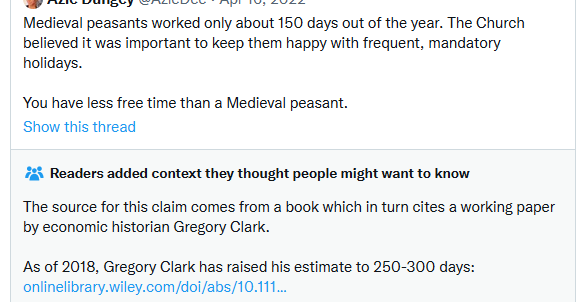The answer is, as usual when a meme is involved, a bit more complicated.
For starters (and as it was pointed out here numerous time in comments) it depend on what "day" is.
Meme says something like "you now work more than medieval peasant". Standard workday is 8 hours. Peasant worked - depending on time of year, and it was mentioned elsewhere in the topic - between 6-8 (in winter) and 16 (in summer, especially in harvest) hours a day, so it is important to define "day".
Even today, with mechanization and automation available, farming is one of the most labor intensive activities, so it's not a surprise that it have been much more so several centuries back - it could be as much as 200-250 days a year.
On the other hand, families back then also have been substantially bigger - not only there were usually three generations living in the same household, everyone worked until one literally couldn't; be it "not yet" or "not anymore". This means that same amount of work, split between 12-15 people instead of 5-6, could be done faster. This is very important, because traditionally farm land was rented from the landlord in exchange for any kind of payment: money, fraction of the harvest, work on landlord's fields, work for landlord directly or all combined. However, the payment due was from household, and not per person, thus more children meant more hands for fixed "amount" of work required by landlord (Serfdom and slavery in the European economy, 11th-18th centuries, ed. S. Cavaciocchi, Firenze University Press 2014.)
In addition, those were the times where religion and faith played far greater role in life than today, so any and all religious holidays were usually free from work - bear in mind though, that there is no such thing as a truly work-free day on medieval farm - which can be a fair number of days in a year.
Best yet, in some part the meme is correct - peasants on average didn't work more than the mentioned 150 days (or even less).
But basically until the end of the 16th century, mostly because later came climate change and yields decreased drastically, forcing farmers to increase the area of cultivation, in effect often doubling their workload just to grow food. But wait, there's more. The duties of a peasant were multitude: from standing night guard in the landlord's manor, to transporting landlord's goods, make repairs to his household or to roads and bridges...
So this meme is a case of one having at least some truth in it - sadly, the rest of it is of the "in the good, old days of the golden age" of grandfathers' tales category, because in 18th century, for example, the number of days was usually more than 150. As usual, the poorest had the worst (yes, even then there were wealthy and poor peasant - difference usually was in having draft animals), who had to work sometimes even 600-700 days in a year... Not a good number, that.
(Serfdom. The real history of Polish slavery, Kamil Janicki, 2021)

